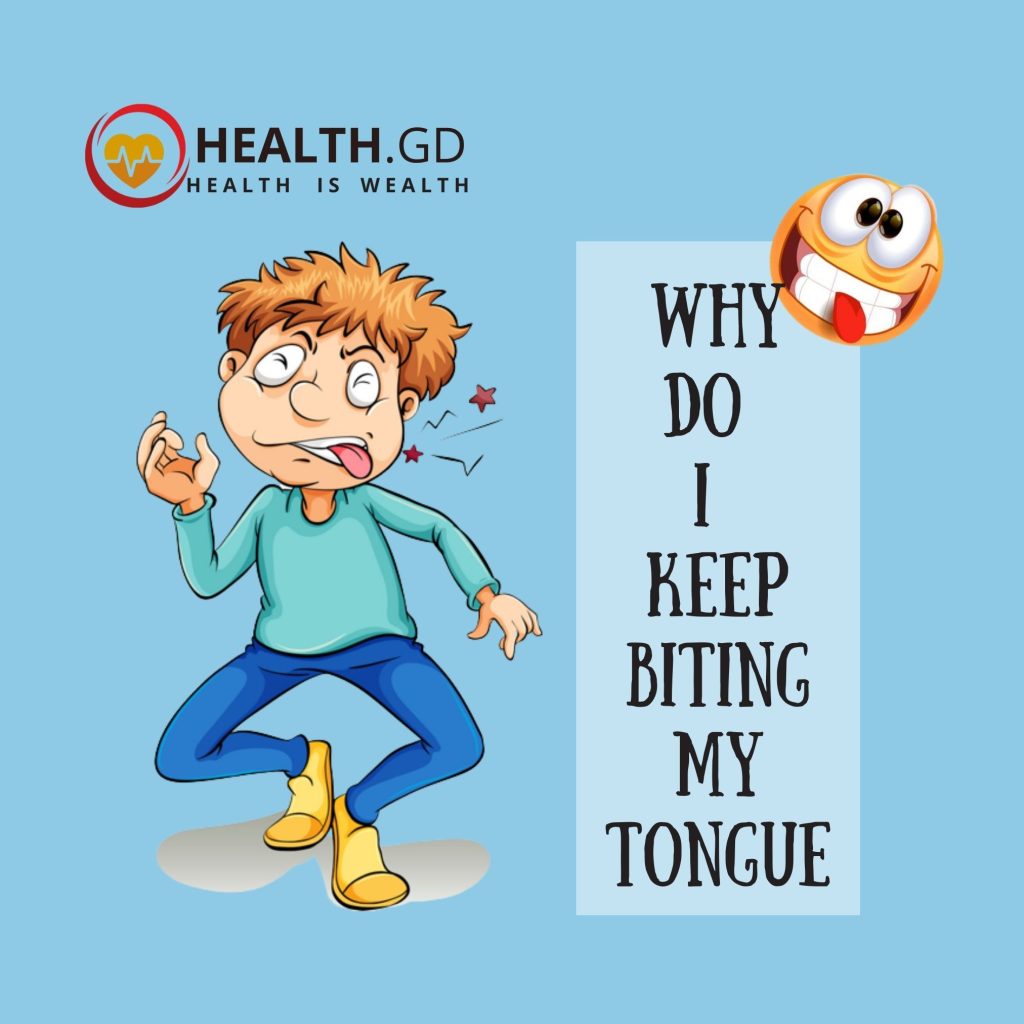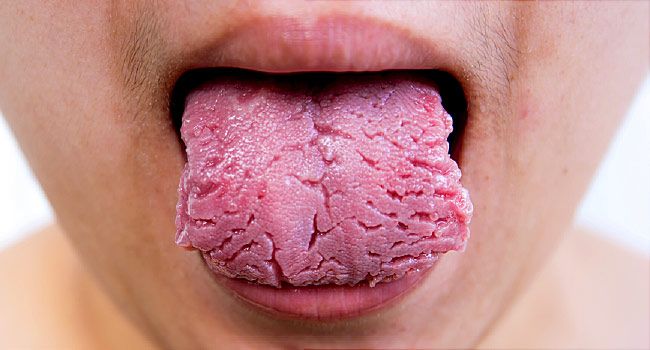Why do I keep biting my tongue? Biting and chewing the tongue is a problem that affects many people. For some, it occurs while eating, during normal daytime wakefulness or conversation, while for others it occurs at night while they are sleeping. Most often, the tip and lateral surfaces of the tongue are bitten.

Although the problem of tongue biting often begins in early childhood, it may first occur in adolescents or adults, depending on the cause.
If you have already searched the Internet, you will find many people talking about biting their tongue and cheeks during the entire period of their life.
The dangers of biting the tongue and its signs
Some of the dangers of tongue biting include damage to the lateral portions of the tongue, often in combination with lesions of the mucous membranes of the cheeks, especially in morsicatio buccarum (Latin for “cheek irritation”). In this condition, chronic damage to the mucous membrane of the inner surface of the cheeks is observed, caused by constant or periodic biting or chewing.
Soreness, wounds, and ulcers can also be the result of bites, especially if you suffer from this problem severely and for a long time. It can also make it difficult to chew and eat, as well as make sounds. Finally, clicking sounds and whistling may be present during the conversation in people suffering from this problem.
What Foods To Avoid With Enlarged Spleen
An enlarged spleen, or splenomegaly, consists of an increase in the size of the organ. Here we will give a complete guide about what foods to avoid with an enlarged spleen?
As to whether you can die from biting your tongue, the answer is no. Tongue biting by itself cannot be fatal unless you bite your tongue off completely or bleed excessively if not treated promptly.
Why do I keep biting my tongue?
Why do I keep biting and/or chewing my tongue when I sleep, talk, eat and/or at night and also bite my cheek? Is this an accident or have I developed some kind of disorder? Can it be caused by nervous tension and stress, anxiety, or be the result of an illness? Relax and wait, let’s look at the possible reasons why you keep biting or chewing your tongue.
Accidental biting and biting of the tongue while eating
Occasionally, someone may bite their tongue (and/or lips and inner cheek) while eating. It can also be an accident, which is more common if you have “a disproportionately large tongue or crowded/uneven teeth”. Such tongue bites can be superficial or deep, most often not permanent, but occurring from time to time.
If you bite your tongue while chewing, the resulting bleeding, pain, and soreness, the nature of the wounds and ulcers depend on the depth of the bite. In some cases, emergency treatment may be needed because you are losing too much blood.
Once you’ve bitten your tongue, you should be careful while eating or talking afterward for the next few days, as even a slight swelling of your tongue makes it more likely that you’ll bite it again.
How to avoid biting your tongue while eating or talking
If you have a normal bite, you just need to be careful when eating. Avoid fast food, as well as any activity that may distract you or prevent you from focusing on food.
However, if you have an overbite, see an orthodontist who can recommend a variety of treatments, both surgical and non-surgical. Such as changing the shape of the dentition, reconstruction, and prosthetics of teeth.
What Foods To Avoid With Calcific Tendonitis
The tendinitis is tendinopathy or a disease of the tendons or connected premises. It is an inflammatory-based disorder, triggered by an acute event (rarer) or chronic repetition of micro-stresses (more frequent).
The habit of biting the tongue

Habits are things we stick to all the time and can be very hard to get rid of. For some people, the constant biting of the tongue is nothing more than the result of a developed habit of biting it. This is usually caused by anxiety, fear, stressful tension, and other emotions that cause a lot of vivid experiences.
If you constantly bite your tongue, then you may develop an involuntary habit of biting it, which you need to get rid of. Cognitive-behavioral psychotherapy, as well as habit change techniques, are likely to be required to effectively treat such a situation. And the help of a qualified psychotherapist can help you completely get rid of this problem.
Biting tongue while sleeping
While tongue biting can happen accidentally while you are talking or eating, some people experience it while sleeping by biting their tongue on the side they lie on. Sometimes, biting can be so severe that people find bloodstains on their pillows in the morning. Don’t be surprised if you develop ulcers on your tongue from biting it at night.
Questions such as “I bite my tongue in my sleep all the time” or “why do I keep biting my tongue in my sleep” are common on the internet. This serves to illustrate the importance and seriousness of the problem. For example, here’s what some people who have this problem say.
“I constantly bite my tongue while I sleep, and the further, the worse. This does not happen every night, but 2-3 times a week. Can you tell me what can be done about it? “
“I bit my tongue in my sleep. My wife noticed this about a year ago, but I know it lasted longer because I woke up with a very painful, swollen tongue with deep bite marks for over two years. It really hurts and I don’t know what makes me do it and how I can stop it. Everyone says it must be due to stress, but I think it’s because my tongue is too big for my mouth or my teeth are at the wrong angle… Sometimes I feel so bad that it hurts to speak and my tongue bleeds. Can anyone suggest any solutions?
It is clear that in the above messages you can see what suffering and anxiety people experience when they bite their own tongue at night.
Reasons for biting your tongue in your sleep
Tongue chewing during sleep may not be a very significant problem if it occurs from time to time. You may accidentally bite your tongue while you sleep, especially if you have a disproportionately large tongue or malocclusion. Probably then you would bite your tongue while awake or eating.
However, you may not have what many people develop as a result of tongue biting while sleeping. Biting can be caused by nocturnal seizures, movement disorders, or bruxism (teeth grinding). All three of these reasons can often lead to persistent tongue biting, as you may have involuntary tongue biting while you think it is voluntary (i.e., consciously controlled)
Tongue biting in babies
The habit of biting, sucking on your tongue, cheeks, or lips may begin to develop in young children. They can occur in children as young as 2, 3, 4, 5, or 6 months of age. This can be not only a habit but also a means of alleviating symptoms that are unpleasant for a child with a burning sensation in the mouth or with temporomandibular disorders.
Another possible cause of tongue biting is teething or irritation caused by an infection in the mouth or throat. If this is the case, give your child a toy to bite into instead of biting his tongue.
To illustrate the severity of this problem, here is what some mothers report:
“ Recently, I have noticed that my child looks like a cow chewing cud. He does this throughout the day, here and there, and he doesn’t seem to experience any discomfort. I checked his gums, they don’t look red or irritated.” – Rahme
“Help! My son (1 year 10 months) bit his tongue. He was sick, his tonsils were swollen and his throat was irritated. What medicine should I give to heal a sore on my child’s tongue?
How to stop biting your tongue?
In reviewing each of the possible reasons for biting your tongue, we have mentioned treatments or methods for getting rid of the habit of biting your tongue (constant or intermittent, conscious or involuntary). In this part, we will give you some general guidelines that can help you even more with biting your tongue.
Visit your dentist and therapist to learn how you can manage this problem and learn how to use oral protection to avoid damage to your teeth and mouth injuries, especially if you are actively involved in sports.
What Foods Need To Avoid For Ovarian Cysts
Ovarian cysts are very common in women, and in most cases, their nature is not dangerous. Here we discuss the list of foods to avoid with ovarian cysts.
How to cure a bitten tongue?
We looked at the causes and treatments to help stop biting or chewing your tongue. If you have already bitten your tongue or have a bite wound, how can you heal it quickly?
In case of bleeding, press down on the wound, as blood flows under pressure. Such first aid will help with small bites of the tongue. To do this, press the wound against your cheek or palate, depending on the location of the injury. In this case, you can use an ice cube or a clean cloth.
Second, inspect the wound to see how severe the bite is. If the wound is deep, see a dentist for further treatment.
For small bite wounds, you can use a saltwater rinse. This will help speed up healing as it prevents bacterial contamination of the bite area. Stir 1 teaspoon of sea salt in a glass of warm water for 20 seconds and use the solution.
Other effective home remedies include vitamins B and C, zinc supplements, magnesium hydroxide (milk of magnesia), baking soda, oral adhesive pastes, hydrogen peroxide, mouth rinses and gels, aloe, and topical short-term application of ice to bite site.
How long it takes to heal a bite wound depends on the depth of the injury. If you have tried various remedies and your tongue sores have not healed within a few days or about a week, see your dentist for further help.
Reference:
| Name | Website URL |
| Wikipedia | CLICK HERE TO VISIT |








